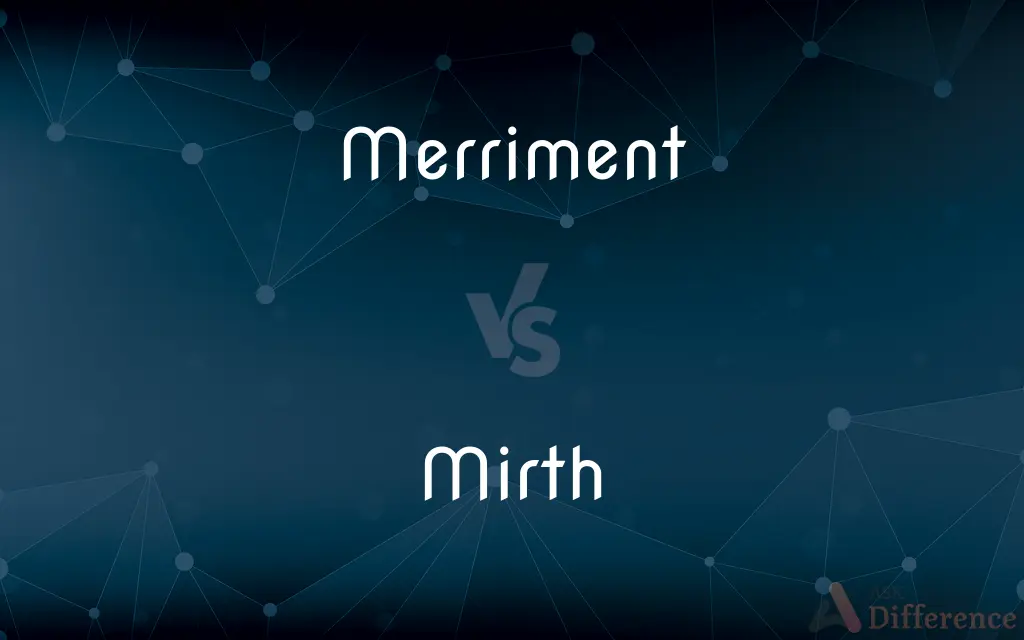Merriment vs. Mirth — What's the Difference?
By Tayyaba Rehman & Fiza Rafique — Updated on April 23, 2024
Merriment involves activities that cause laughter and enjoyment, often in social settings, while mirth refers to the emotion of joy and amusement, typically expressed through laughter.

Difference Between Merriment and Mirth
Table of Contents
ADVERTISEMENT
Key Differences
Merriment is typically associated with the act of celebrating or engaging in enjoyable activities that lead to laughter and fun, often in a group setting. On the other hand, mirth is more about the feeling of joy and amusement that one experiences, which can be either in solitude or socially.
Merriment is often visible and external, observed in actions like parties, festive gatherings, or playful activities. Whereas mirth, although it may be expressed outwardly, is an internal state, a spontaneous expression of joy that isn’t necessarily tied to a specific event.
The occasions that induce merriment usually involve planned events or social gatherings, such as weddings, festivals, or holiday celebrations. In contrast, mirth can be triggered by anything that amuses a person, ranging from a joke to an unexpectedly delightful situation.
Merriment often requires some sort of stimulus — a reason for the joyous behavior, like a celebratory occasion or entertainment. Meanwhile, mirth can arise without any external cause; it may be a result of a sudden thought, memory, or anything that tickles the fancy.
While merriment is usually shared among people and tends to be contagious in social settings, mirth, though it can be shared, is more personal and can be fully experienced even when alone.
ADVERTISEMENT
Comparison Chart
Definition
The act of enjoying oneself with others, often through laughter and celebration.
The emotion or expression of joy and amusement.
Expression
External and observable in social activities.
Internal feeling, may be expressed outwardly.
Occasion
Often linked to specific events or gatherings.
Can occur spontaneously, without a specific occasion.
Dependency
Generally requires a stimulus or reason.
Can arise independently of external stimuli.
Social Context
Typically involves groups or public settings.
Can be experienced individually or in groups.
Compare with Definitions
Merriment
Joyful activities and celebrations.
The fair was filled with merriment and laughter.
Mirth
Amusement, especially as expressed in laughter.
His humorous tales were met with hearty mirth.
Merriment
The act of making merry; enjoying festivities.
The streets echoed with sounds of merriment.
Mirth
The emotion of great joy or happiness.
Her face lit up with mirth at the surprise.
Merriment
Lively and cheerful fun.
The party was a scene of great merriment.
Mirth
A source or cause of laughter.
The comic’s routine was full of mirth.
Merriment
Activities that bring about joy and entertainment.
The games added to the evening's merriment.
Mirth
The quality of being amusing or comic.
The playful banter added mirth to their conversation.
Merriment
The condition of being merry and jovial.
Their merriment was contagious to all who joined the gathering.
Mirth
A state or an instance of merry laughter.
The room was filled with mirth during the comedy show.
Merriment
Gaiety and fun
Her eyes sparkled with merriment
Mirth
Gladness and merriment, especially when expressed by laughter.
Merriment
High-spirited fun and enjoyment; hilarity.
Mirth
The emotion usually following humour and accompanied by laughter; merriment; jollity; gaiety.
Merriment
A state of enjoyable exuberance.
Mirth
That which causes merriment.
Merriment
Playful fun.
Mirth
Merriment; gayety accompanied with laughter; jollity.
Then will I cause to cease . . . from the streets of Jerusalem, the voice of mirth.
Merriment
Gayety, with laughter; mirth; frolic.
Methought it was the soundOf riot and ill-managed merriment.
Mirth
That which causes merriment.
Merriment
A gay feeling
Mirth
Amusement, especially as expressed in laughter
His six-foot frame shook with mirth
Merriment
Activities that are enjoyable or amusing;
I do it for the fun of it
He is fun to have around
Mirth
Great merriment
Common Curiosities
Can merriment be experienced alone?
While typically associated with group activities, one can experience merriment alone, though it is less common.
Is mirth dependent on social interactions?
No, mirth is an internal emotion of joy that can occur with or without social interactions.
How does mirth manifest physically?
Mirth often manifests through laughter, smiling, or a general light-heartedness.
Are there cultural differences in how merriment and mirth are expressed?
Yes, cultural norms influence how openly merriment and mirth are expressed.
What environments are conducive to merriment?
Environments that are social, festive, or celebratory typically foster merriment.
Can merriment induce mirth?
Yes, activities causing merriment often lead to feelings of mirth among the participants.
What are common misunderstandings about merriment and mirth?
A common misunderstanding is that merriment and mirth are always experienced in large groups, whereas both can occur in more intimate settings or even when alone.
What typically triggers merriment?
Merriment is typically triggered by specific joyful events, social gatherings, or celebrations.
How do merriment and mirth compare in terms of duration?
Merriment may last as long as the enjoyable event or activity continues, while mirth can be fleeting, often as quick as the laughter that expresses it.
Does mirth need a special occasion?
No, mirth does not require a special occasion and can arise spontaneously from amusing thoughts or situations.
Share Your Discovery

Previous Comparison
Advocate vs. Advocator
Next Comparison
Exit vs. ExeuntAuthor Spotlight
Written by
Tayyaba RehmanTayyaba Rehman is a distinguished writer, currently serving as a primary contributor to askdifference.com. As a researcher in semantics and etymology, Tayyaba's passion for the complexity of languages and their distinctions has found a perfect home on the platform. Tayyaba delves into the intricacies of language, distinguishing between commonly confused words and phrases, thereby providing clarity for readers worldwide.
Co-written by
Fiza RafiqueFiza Rafique is a skilled content writer at AskDifference.com, where she meticulously refines and enhances written pieces. Drawing from her vast editorial expertise, Fiza ensures clarity, accuracy, and precision in every article. Passionate about language, she continually seeks to elevate the quality of content for readers worldwide.
















































